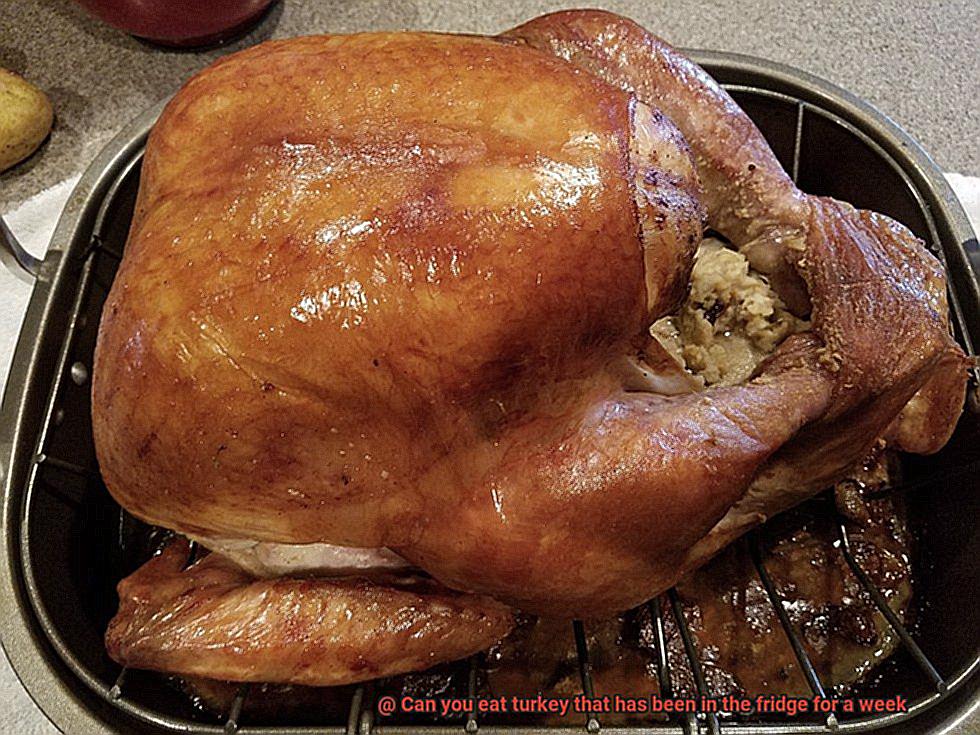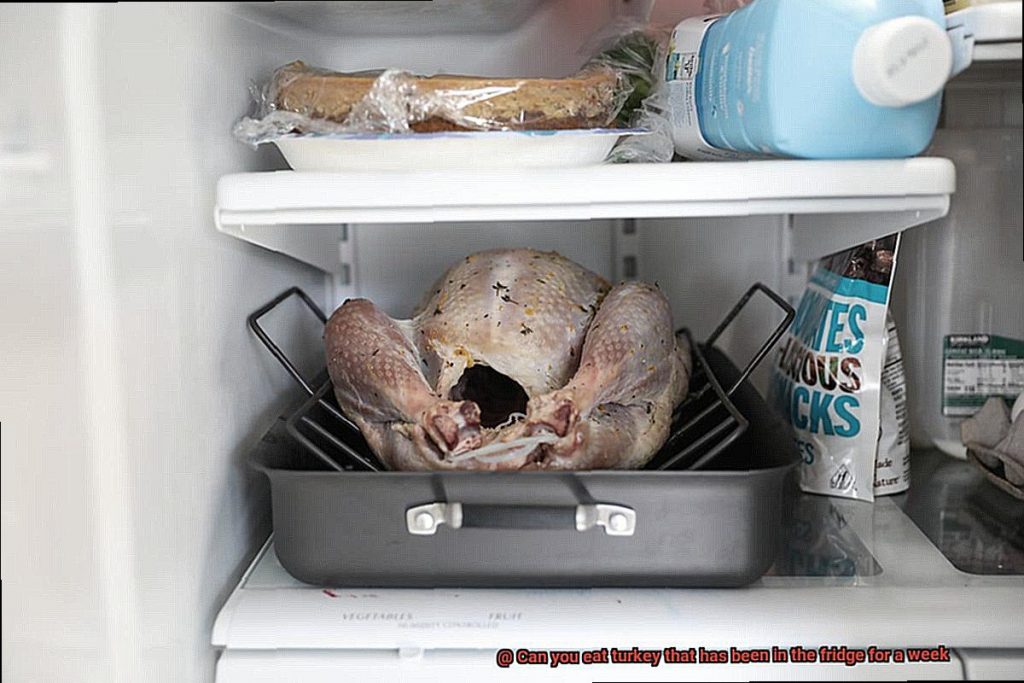Ah, turkey leftovers – the quintessential post-holiday meal. After all the festivities have died down, there’s nothing quite like a leftover turkey sandwich to keep the party going. But how long is too long to keep that bird in the fridge? Can you still safely consume it after a week?
Let’s face it; nobody wants to waste perfectly good food. However, when it comes to leftover turkey, there are some risks involved that you need to be aware of. The last thing you want is to spend your day hunched over the toilet bowl because you decided to take your chances with expired poultry.
So, can you eat turkey that has been in the fridge for a week? Unfortunately, there’s no simple answer. It depends on how well you’ve stored it and how long it’s been sitting in your fridge. Luckily, we’re here to help guide you through this tricky situation.
In this blog post, we’ll delve into the nitty-gritty of turkey shelf life in your refrigerator. We’ll cover everything from proper storage techniques to reheating methods and recommended guidelines for keeping your leftovers safe and delicious. Whether you’re planning on whipping up a leftover turkey casserole or simply enjoying a classic sandwich, we’ve got you covered.
So sit back, relax, and let us help you navigate the murky waters of leftover turkey safety. By the end of this post, you’ll know whether that week-old bird is still safe to eat or if it’s time to bid adieu and toss it out.
Contents
How Long Can Raw Turkey Be Stored in the Fridge?
Raw turkey is a popular meat during the holiday season, but it’s crucial to know how long it can be stored before it becomes unsafe to eat. In this article, I will provide a comprehensive guide on storing raw turkey in the fridge.
To begin with, raw turkey should only be stored in the fridge for a maximum of two days. This is because bacteria thrive on raw meat, and after two days, the risk of foodborne illness increases significantly. It’s important to note that this two-day rule applies only to properly stored raw turkey. The temperature of your fridge should be set at or below 40°F (4°C) to prevent bacterial growth. Moreover, the turkey should be stored in its original packaging or in a covered container to avoid cross-contamination with other foods.
If you plan on keeping raw turkey in the fridge for longer than two days, it’s advisable to freeze it instead. Raw turkey can be frozen for up to six months without risking food poisoning. Freezing not only extends the shelf life of your turkey, but it also helps lock in its freshness and flavor.
It’s equally important to store cooked turkey correctly in the fridge if you have any leftovers. Cooked turkey can last for up to four days if stored properly. The leftovers should be placed in an airtight container or wrapped tightly with plastic wrap to prevent any contamination from other foods in the fridge. Additionally, it should be placed on a shelf rather than in the door of the fridge where temperatures can fluctuate more easily.
Even if your turkey has been stored correctly, it’s essential to check for any signs of spoilage before consuming it. If you notice any foul smell or slimy texture, it’s best to discard it immediately instead of risking food poisoning.
How Long Can Cooked Turkey Be Stored in the Fridge?
Let me share with you some tips to help keep your leftovers fresh and safe to eat.
First and foremost, the USDA recommends storing cooked turkey in the fridge for a maximum of four days. This means that if you cooked your turkey on Monday, it should be consumed by Friday. However, it’s essential to remember that the clock starts ticking as soon as the turkey is cooked. If you’re unsure about when it was cooked or how long it’s been sitting in the fridge, it’s better to discard it than risk food poisoning.
It’s vital to keep an eye out for signs of spoilage when examining leftover turkey, such as a pungent odor, slimy texture, or discoloration. If any of these are present, it’s time to toss out the turkey. Remember, when it comes to food safety, it’s always better to be safe than sorry.
To prevent contamination and spoilage, it’s crucial to store leftover turkey correctly. The USDA suggests using shallow containers or resealable plastic bags that are airtight. This helps to prevent bacterial growth and keeps the turkey fresh for a more extended period.
In summary, while enjoying leftover turkey for days after your holiday feast may seem tempting, prioritizing food safety is essential. By following proper storage techniques and consuming leftover turkey within four days, you can enjoy your meal without worrying about getting sick. So go ahead and indulge in your delicious leftovers without any concern.
Proper Storage of Cooked Turkey in the Fridge
Don’t let that delicious bird go to waste. Proper storage of cooked turkey in the fridge is essential to maintain its freshness and safety, and as an expert on this topic, I’m here to guide you through the process.
The first step in storing cooked turkey is to let it cool down before putting it in the refrigerator. Leaving it at room temperature for too long can cause bacteria to grow and put your health at risk. Once the turkey has cooled down, cover it tightly with aluminum foil or plastic wrap to prevent any odors from contaminating the meat. Alternatively, store it in an airtight container for optimal freshness.
It’s important to store the turkey on the bottom shelf of the fridge so that any juices do not drip onto other foods and cause cross-contamination. Additionally, keeping an eye on the temperature is crucial. The fridge should be set below 40°F (4°C) to ensure that the turkey stays safe to eat. And don’t forget about air circulation. Leave some space in your fridge for consistent temperature control.
How long can you keep cooked turkey in the fridge? Typically, it’s safe to consume within 3-4 days. However, if properly stored and kept at a consistent temperature, it can last up to a week in the fridge. But always use your best judgment when it comes to food safety. Check for any signs of spoilage before consuming your leftover turkey, such as odd odors, discoloration or sliminess.
Checking for Signs of Spoilage Before Eating
Here, I will be sharing some essential tips on how to check for signs of spoilage before eating turkey that has been in the fridge for a week.
Let’s start with our sense of smell. If you notice any unpleasant or sour odors emanating from your turkey, it’s time to say goodbye. Trust me; a bad smell is often a strong indicator that the turkey has gone bad and should be discarded immediately.

Next, inspect your turkey’s skin and flesh for any discoloration. Darkened areas or greenish patches are a significant warning sign that bacterial growth and spoilage have occurred. So, keep an eye out for any unusual colors on your turkey.
Another crucial aspect to consider is the texture of your turkey. If it feels slimy or sticky to the touch, it means bacteria have started to grow on it and should be thrown away without a second thought. Trust me; slimy meat is never worth the risk.
Lastly, always check the expiration date on the package or label of your turkey. If it has already passed, it’s best not to take any chances and dispose of it immediately. While turkey leftovers may be tempting, they’re not worth risking our health over.
In summary, checking for signs of spoilage before consuming turkey that has been in the fridge for a week is essential for your health and safety. Always trust your instincts and err on the side of caution when in doubt about the freshness of your food. To help you remember what to look out for, here’s a quick summary:
- Check for bad smells
- Inspect for discoloration
- Pay attention to texture
- Don’t forget to check the expiration date.
Possible Health Risks Associated with Eating Spoiled Turkey
While turkey is a popular dish during holidays or any special occasion, it’s important to ensure that you handle and store turkey properly to avoid any potential health risks. Eating spoiled turkey can lead to food poisoning, which can be dangerous and even deadly in some cases.
When turkey is stored in the fridge for too long, bacteria can grow on it, leading to spoilage. The longer the turkey is stored, the higher the risk of it spoiling. This means that if you’re not careful, you could be putting yourself at risk of serious illness simply by consuming spoiled meat.
Eating spoiled turkey can cause a range of unpleasant symptoms such as nausea, vomiting, diarrhea, fever, and stomach cramps. But the risks go beyond just feeling sick – in severe cases, it can even cause organ damage or death. It’s not worth taking any chances when it comes to consuming food that has gone bad.
The reason behind this is that bacteria such as Salmonella and Campylobacter can grow on the turkey if left in the fridge for too long. These bacteria produce toxins that can cause food poisoning. These bacteria are also resistant to antibiotics, which makes it difficult to treat infections caused by them. This means that even if you seek medical attention after consuming spoiled turkey, there may not be much that can be done to help you.
It’s also worth noting that some people may be more susceptible to food poisoning than others. Pregnant women, young children, elderly individuals, and those with weakened immune systems are at a higher risk of developing complications from food poisoning. Therefore, it’s essential to ensure that turkey is stored properly and consumed before it spoils to reduce the risk of food poisoning.
To avoid any potential health risks associated with consuming spoiled turkey, make sure to follow these tips:
- Store your turkey in the fridge at a temperature of 40 degrees Fahrenheit or below
- Consume your turkey within 3-4 days after it has been cooked
- If you’re not sure if your turkey has gone bad, use your senses to check for any signs of spoilage such as a bad smell, slimy texture, or discoloration
- When in doubt, throw it out. It’s better to be safe than sorry when it comes to food safety.
Tips for Safely Thawing and Cooking Turkey
Safely Thawing and Cooking a Turkey from the Fridge
When it comes to cooking a turkey that has been in the fridge for a week, safety is paramount. To ensure that your turkey is safe to eat, you must properly thaw and cook it. Here are five steps you can follow:
Thawing Your Turkey
The key to safely thawing a turkey is to do so slowly and under controlled conditions. The best way to thaw your turkey is in the refrigerator. Plan ahead and allow enough time for the turkey to thaw completely. A good rule of thumb is to allow 24 hours for every 4-5 pounds of turkey. So if you have a 12-pound turkey, you should thaw it in the fridge for at least three days.
If you’re short on time, you can use the cold water method. Place the turkey in a large container and fill it with cold water. Change the water every 30 minutes, and allow about 30 minutes per pound of turkey. However, this method should only be used if you’re able to cook the turkey immediately after it’s thawed.
Cooking Your Turkey
When cooking your turkey, it’s essential to ensure that it reaches an internal temperature of 165°F (74°C). Use a meat thermometer inserted into the thickest part of the bird without touching bone to check if your turkey is fully cooked.
Roasting is a popular method for cooking turkeys. Preheat your oven to 325°F or higher and place your turkey on a roasting pan with the breast side up. Baste occasionally with juices from the pan or butter to keep the meat moist. The cooking time will depend on the weight of your turkey, but a general guideline is about 15-20 minutes per pound.
Resting Your Turkey
After your turkey is fully cooked, let it rest for at least 15-20 minutes before carving. This allows the juices to redistribute throughout the meat, resulting in a more tender and juicy bird.
Food Safety Basics
During the preparation process, it’s essential to practice good food safety habits. Wash your hands and any surfaces that come into contact with raw turkey with hot soapy water. Use separate cutting boards and utensils for raw meat and other ingredients to avoid cross-contamination.
Checking for Spoilage
Even if your turkey has been stored properly and cooked to the right temperature, it’s crucial to check for signs of spoilage before consuming it. If the meat has a foul smell or slimy texture, it’s best to throw it away instead of risking food poisoning.
Alternatives to Eating Spoiled Turkey
In this guide, we will explore alternatives to consuming spoiled turkey that can save you money and keep your taste buds satisfied.
Firstly, it’s crucial to remember that if the turkey has been stored correctly at a temperature of 40°F or below, it should still be safe to consume within a week. However, if you’re unsure about the freshness or safety of the turkey, there are a few alternative options you can consider:
Freeze the turkey:
Freezing is an excellent option when it comes to preserving the freshness and safety of your leftover turkey. Instead of leaving it in the fridge for an extended period of time, consider freezing it if you know you won’t consume it within a few days. This way, you can enjoy your turkey at a later date and reduce food waste.
Repurpose the turkey:
Rather than consuming the turkey as is, try repurposing it into a different dish. Shred the turkey and use it in soups, stews, or casseroles where it will be cooked at a high temperature, ensuring any potential bacteria will be killed off. You can also use leftover turkey to make sandwiches or salads, but make sure to thoroughly wash any fresh produce used in these dishes. Get creative with your recipes and try something new.
Dispose of the turkey:
If you’re still unsure about the safety of your turkey after a week in the fridge, it’s best to dispose of it. Consuming spoiled food can lead to food poisoning and other health issues. It’s always better to be safe than sorry when it comes to food safety.
G77S7pV1jIU” >
Conclusion
In summary, leftover turkey is a scrumptious and practical way to relish the festive season without cooking every day. Nonetheless, it’s imperative to store and handle it correctly to prevent any potential health hazards. Raw turkey should not be kept in the fridge for more than two days, while cooked turkey can last up to four days if stored appropriately. Always examine your turkey for indications of spoilage before consuming it, such as unpleasant odors, slimy texture, or discoloration.
If you’re uncertain about the freshness or safety of your turkey, there are several alternatives available. You can freeze it for future use, transform it into various dishes, or dispose of it if necessary.
Remember that food safety should always be your top priority when handling and storing food. By adhering to proper storage techniques and using your senses to detect signs of spoilage, you can savor your leftover turkey without any worries about getting sick.






